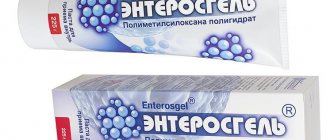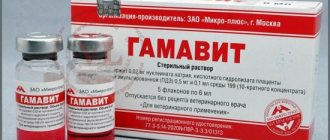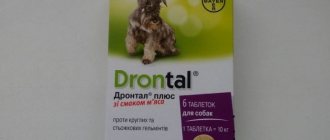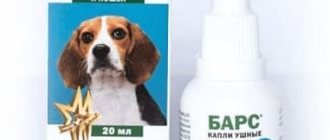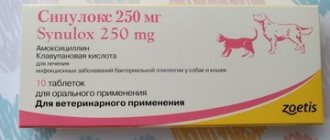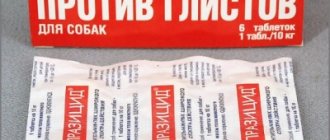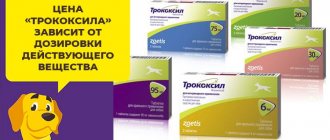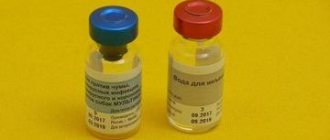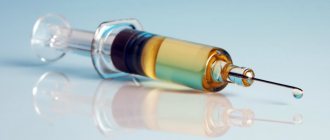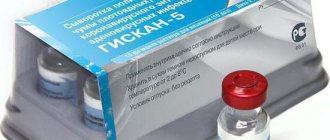general description
Lactobifadol is a powder of uniform consistency. It is usually beige in color, but a yellowish or off-white color may be present. It is packaged in polyethylene bags, which are hermetically sealed from the factory. Packages of 50 g are also placed in a cardboard box, but larger packages are sold without secondary packaging, but their purchase is rational for large farm animals (cows, horses) or when keeping pets in groups.
The drug contains bifidobacteria and lactobacilli. They are dried in a special way using modern equipment, thanks to which they fully retain their properties. Their advantage is that they are adapted for animals and can multiply quickly in the intestines. The auxiliary component is wheat flour.
Why are they needed?
The difficulty is that the effectiveness has not been definitely proven and many people have the question “In what cases does a dog need probiotics?” The main purpose of such drugs is to restore the intestinal microflora and increase the immunity of dogs and animals with digestive problems (diarrhea) weakened after antibiotic treatment.
Everyone knows that antibiotics kill not only harmful bacteria, but also beneficial ones. Probiotics populate the intestines with beneficial microorganisms, thereby reducing the destructive effects of antibiotics on microflora, helping to stop diarrhea and gases, but do not speed up the healing process. However, they can be given several hours after antibiotics. You cannot give both at the same time.
They are usually prescribed in combination with other drugs, but it should be remembered that it is unacceptable to give them to healthy dogs on a regular basis. Healthy pets need a balanced diet; for example, when feeding them naturally, the diet should include natural kefir without additives, low-fat yogurt, and yogurt. It is useful to give dogs cow tripe, because the green film on the tripe is a natural probiotic. Dry food usually already contains probiotics as a dietary supplement.
If we talk about the benefits of probiotics for dogs, it should be mentioned that they participate in the breakdown of fatty and bile acids, thereby helping to regulate the dog’s weight by reducing the amount of absorbed fats, and also take part in the breakdown of carbohydrates, thereby reducing the risk of allergic reactions. reactions after an animal consumes a number of allergenic foods.
Puppies that do not feed on their mother’s milk need beneficial bacteria, which act as a shield against pathogenic bacteria and help a weakened body. When switching a puppy to adult food, probiotics are also needed to avoid upset of the digestive system.
The drugs are prescribed to pregnant and lactating bitches to avoid disturbances in the body's microflora and to older dogs.
Sources:
https://doglunch.ru/articles/probiotiki-i-prebiotiki-dlya-sobak-kakie-oni-i-chto-oni-delayut
https://v-mire-sobak.ru/korm-dlja-sobak/probiotiki-dlja-sobak.html
Biological properties
The effectiveness of the medicine is achieved due to the high content of beneficial bacteria. After penetrating the intestines, they begin to multiply and secrete lactic acid, which helps displace pathogenic flora, including salmonella, protea, E. coli and other pathogens of intestinal infections.
The drug also has the following effects on the body:
- improves intestinal motility;
- increases immunity;
- improves the absorption of minerals, vitamins and other beneficial substances from food;
- restores intestinal microflora;
- helps eliminate the consequences of stressful situations;
- removes waste and toxins from the body;
- improves the condition of the skin and coat;
- strengthens bones and connective tissue, joints;
- normalizes metabolism;
- regulates calcium-phosphorus metabolism;
- has a positive effect on the functioning of the liver, kidneys and other internal organs;
- prevents obesity;
- helps to gain weight if you are underweight;
- improves digestion;
- increases appetite.
Lactobifadol for dogs up to 5 years of age and puppies promotes proper development and growth. After injuries and operations, the drug helps the body recover faster, as the body better absorbs the necessary vitamins and minerals, and regeneration processes are stimulated.
How do probiotics for dogs work:
The intestines of any animal, like humans, are inhabited by various strains of pathogenic, beneficial and opportunistic flora. As long as the number of microorganisms is in dynamic balance, the gastrointestinal tract system functions without failures, food is digested and absorbed in the proper volume. The pet feels good and pleases its owners. When the balance is disturbed, pathogenic flora begins to actively multiply, colonizing the intestines. As a result, food absorption is impaired, problems with defecation appear, and the dog’s general well-being worsens.
Probiotics for dogs work as follows:
- inhibit the growth and reproduction of pathogenic flora;
- normalize digestive processes;
- participate in the production of vitamins necessary for the life of the pet;
- strengthen the body's immune defense.
Indications for use
Medicine is prescribed for dogs in the following cases:
- with dysbacteriosis, regardless of the cause of its appearance;
- for digestive disorders (diarrhea, constipation, vomiting);
- for infectious intestinal lesions;
- to improve immunity.
The drug can be used to prevent dysbiosis and pathologies of the gastrointestinal tract. Often the drug is used as part of complex therapy in the following cases:
- for pathologies of the kidneys, liver, pancreas;
- during the rehabilitation period after surgery, injuries or serious illnesses.
Lactobifadol helps restore the intestinal microflora after antibacterial therapy and taking anthelmintic drugs, as well as stress (transportation, departure of the owner, visit to the hospital, etc.). If taken before stress, it helps to cope with it without consequences for the pet’s health.
The drug is recommended for puppies during the growth period, pregnant and lactating females, and aging animals who have a high risk of developing age-related dysbiosis.
Note! Lactobifadol has no contraindications. It can be used for small puppies and adult pets of any age. Breed, weight and general health do not matter.
Reviews and forecasts
15.12.2017
Probiotics for animals on the Russian market
Probiotics (symbiotics, synbiotics, eubiotics)
are live microorganisms that are not toxic under any influence, capable of having a positive effect on the body of animals, including birds and fish, due to the formation and maintenance of a safe bacterial background in their digestive tract, and in places of detention, promoting normal, healthy development.
The history of their discovery, study of properties, and attempts to use them for humans and animals is quite long. But until the early 2000s in our country, the use of probiotics in feeding and keeping animals was in its infancy. This is mainly due to the fact that the basis of all preventive and therapeutic measures to combat diseases - disinfection, vaccination and antibiotic therapy - over decades of its use has developed with absolutely no alternative. Why waste resources looking for some innovations if tried and tested methods give good results. In fact, the main idea of this method was and remains the maximum sterilization of not only the habitats of animals, but also of them themselves. Since all diseases are caused by bacteria and viruses, it is necessary to minimize the contact of animals with them, and in case of a “breakthrough”, destroy them with antibiotics.
For a long time the process went very successfully, but then it began to fail more and more often. It gradually became clear that it is impossible to completely eliminate the contamination of animals with pathogenic microorganisms, and with a deficiency of normal microflora in animals from the first days of life, this contributes to the rapid proliferation of unwanted microbes and slows down the formation of immunocompetent organs. Preventive antibiotic therapy completely disrupts the microecological balance of the intestinal microflora, which not only leads to the dominance of pathogenic microbes, but also accelerates the rate of mutation of opportunistic microorganisms that acquire toxic properties and drug resistance. Decreased immune homeostasis is accompanied by increased susceptibility to bacterial and viral infections.
Practice shows that the current complex of technological, zoohygienic, veterinary and sanitary practices when raising animals does not allow them to maintain a high level of resistance to bacterial infections caused by opportunistic microflora, and the use of antibiotics for the prevention and treatment of gastrointestinal diseases is unsafe and becomes less and less effective.
At this stage, integrating probiotics into the technological chain of feeding and veterinary measures can effectively and fairly inexpensively solve these problems.
Probiotics, unlike antibiotics, do not destroy, but displace pathogenic and opportunistic bacteria from the intestinal microflora, without causing the emergence of their resistant strains. The effect of probiotics does not lead to the addiction of opportunistic microorganisms that have an R-plasmid encoding resistance to chemotherapy.
The waste products of bacteria in probiotics do not accumulate in the organs and tissues of animals and do not affect the commercial quality of the product. Probiotics do not enhance the virulence characteristics of enterobacteriaceae. They are safe for the environment and operating personnel.
Probiotics ensure rapid colonization of the intestines of newborn animals with normal microflora and create a biological barrier that blocks the access of pathogenic and opportunistic bacteria to it.
In addition to the well-known and widely publicized properties of probiotics, ranging from the correction of intestinal biocenosis to their very positive effect on the hormonal and enzymatic systems, the most valuable are the mechanisms of influence on the immune system of animals. When probiotics enter the gastrointestinal tract of animals, a pronounced restructuring of the systems responsible for nonspecific resistance and activation of the T-cell component of immunity occurs. Under the influence of probiotics, the activity of serum lysozyme increases, phagocytosis and bactericidal activity increase. The mechanism that enhances the protective properties of probiotics is the exchange of signaling molecules with immunocompetent cells of the intestinal mucosa, enhancing the production of secretory immunoglobulin A, complement and lysozyme, which block the attachment of enteropathogenic bacteria to the surface of the mucosa, thereby reducing the incidence of gastrointestinal diseases, reducing feed costs, the safety of livestock is increased.
Over the past 15 years, the supply of various probiotics on the market has grown significantly, mainly due to the number of companies offering new names. During this time, certain standards have been developed that apply to their sale:
– the composition of probiotics is mainly determined in proportions: 1–2, less often 3–4 strains of bacteria, water or a dry carrier. Practice has shown that a cocktail of a large number of different strains does not improve the effectiveness of the product, but significantly increases the cost of production;
– the concentration of all bacteria in products is, as a rule, at least 109 CFU per 1 g/ml. Some companies offer more concentrated ones (1011 CFU/g), claiming that this is an indicator of quality. In fact, this is a desire to reduce costs by reducing costs for media, packaging and delivery. This product can only be used effectively when diluted with water. When dry mixing, not every mixer will ensure homogeneity in the feed;
– the price range is more significant and varies from 70 to 1500 rubles. for 1 kg. These numbers are absolute, so it is more correct to evaluate the probiotic by the increase in the cost of 1 ton of feed, based on the dosages specified by the manufacturer, which range from 50 g to 2 kg per 1 ton of feed;
– the bulk of products are registered as feed additives, and there are only a few registered probiotic medicines.
Based on their use, probiotics can be divided into three main groups.
1. Probiotics for individual use.
Applicable:
– individually for young animals from the first days of life, as well as for domestic animals;
– en masse either through drinking or as part of feed with technological restrictions (dry mixing only).
Main composition: microencapsulated, powdered and liquid lacto-, bifidobacteria, yeast, non-pathogenic species of enterobacteria and cocci, possibly in combination with spore-forming, saccharomycetes.
Pros: effective against antibiotic-resistant pathogens and in the first days of life of young mammals.
Minuses:
– oral use only;
– due to instability to high temperatures and pressure, it is impossible to use in special feed preparation plants (expansion, extrusion, granulation). Relatively short shelf life.
2. Feed probiotics.
Applicable:
– for all types and ages of animals, including birds and fish, individually and en masse, orally as part of food and with water;
– for treating animal housing, incubators, hatching eggs and fertilized eggs with aqueous solutions.
Contains 1–4 strains of spore-forming Bacillus Subtilis and Bacillus Licheniformis.
Pros:
1. The spores of these bacteria are thermostable (up to +200°C), withstand freezing, aggressive environments, drying and other types of influences without loss, therefore they have a long shelf life (up to 2 years) and can be used in feed production at any stage under any conditions.
2. They have a sanitizing effect when they come into contact with surfaces where animals are kept, creating a safe bacterial background.
Disadvantages: When producing products with unfinished technology, there may be a low content of spores in the products. In this case, the quality of the product will be lower.
3. Auxiliary probiotics.
Used as preservatives for succulent feed to ensure storage without loss of nutritional qualities
Contains from 1 to 4 strains of lactic acid anaerobic bacteria.
List of companies offering probiotic products on the Russian market
| No. | Company | Name of probiotics | Application | A country |
| 1 | Altbiotech | Enzymsporin | Cattle, poultry, pigs | Russia |
| 2 | Bashinkom | Vetosporin-Zh | bird, fish, bees | Russia |
| Vetosporin-Active | calves, piglets | |||
| 3 | Biotekhagro | Bacell-M | agricultural animals, incl. bird and fish | Russia |
| 4 | Biotroph | Provitol | Cattle, fish | Russia |
| Cellobacterin+ | agricultural animals, incl. bird | |||
| Cellobacterin T | ||||
| 5 | Veterinary Agriculture | Sporothermin | calves, piglets and poultry | Russia |
| 6 | East | Olin | young agricultural animals animal, bird | Russia |
| 7 | Research Center | Vetom | agricultural, domestic animals, incl. bird | Russia |
| 8 | Green lines | AiBi series LcB 24.01 | all animals, incl. domestic, poultry and fish | Russia |
| AiBi series LcB 24.02 | ||||
| 9 | KROS Pharm | Mucinol | all animals, incl. domestic, poultry and fish | Russia |
| Mucinol Extra | ||||
| 10 | Lafid | IMMUNOFLOR | agricultural animals, incl. bird | Russia |
| 11 | Research Institute of Probiotics | Subtilis | all animals, incl. domestic, poultry and fish | Russia |
| Basulifor | ||||
| 12 | Nova | A2 | broiler chickens | Russia |
| 13 | STC Bio | Space | agricultural animals, incl. bird and fish | Russia |
| 14 | Polivit | Rodafen | bird | Russia |
| 15 | Primbiotech | EM-Vita | agricultural animals, incl. bird | Russia |
| 16 | Saf-Neva | Optisaf | agricultural animals, incl. bird | Russia |
| 17 | Trionis Vet | Provagen | agricultural animals, incl. bird | Russia |
| Provagen concentrate | ||||
| 18 | TsMVEI | Pioneer-XL | animals, incl. bird and fish | Russia |
| Intestevit | ||||
| 19 | Alltech | I-Sak | ruminants and horses | Belgium, UK |
| I-Sak 1026 TC | ruminants and horses | USA | ||
| All-Lac XCL 5X | chickens | |||
| 20 | Angel Yeast | Active East | agricultural animals, incl. bird | China |
| Sel East | ||||
| 21 | Biochem | Aviplus | bird | Germany |
| Bioplus 2B | agricultural animals, incl. bird | |||
| Gallipro Tect 200 | bird | |||
| 22 | Biotal | Levicel SC plus | ruminants | Great Britain |
| Levicel SB plus | pigs, agricultural bird | |||
| 23 | Cenzone | Laktur | agricultural animals, incl. bird | USA |
| 24 | Cerbios Pharma | Cilactin LBC ME20 plus | agricultural animals, broilers, dogs | Switzerland |
| 25 | Kemin | Clostatus dry | agricultural animals, incl. bird | Belgium |
| Clostat HC SP dry | pigs, cattle, poultry | |||
| 26 | KRKA | Animavit granulate | pigs | Slovenia |
| 27 | Lesaffre | Actisaf Sc 47 Std | agricultural animals, incl. bird | France |
| Actisaf Sc 47 Hr+ | agricultural animals, incl. bird | |||
| 28 | Lohmann Animal Health | Toyocerin | agricultural animals, incl. bird | Germany |
| 29 | PetAg | Fermacto | pigs, agricultural bird, fish | USA |
| 30 | Shandong Liuhe | Greensafe | pigs, agricultural bird | China |
| Lifesafe | pigs, agricultural bird |
The ratio of domestic to imported sellers is approximately 60:40. Of these, approximately 25% have been on the market for more than 10 years. Despite the fact that the vast majority of Russian participants position themselves as manufacturers, no more than a quarter have a real production base.
The capitalization of fixed assets of such industries is very high. Even a minimal set of used domestic equipment costs so much that it makes production, to put it mildly, very low-profit. This is reflected in the cost and, accordingly, the selling price of the products. The rest are forced to divide production into parts, in one place producing biomass using laboratory equipment left over from specialized institutes from the times of the USSR, in another – mixing and packaging. As a result, the quality of such products leaves much to be desired.
Companies that have their own production base and are “tied” to some large company - a manufacturer of feed or feed ingredients - feel somewhat confident. In this case, you can count on a certain stable sales and promotion together with the “donor” products. In addition, this is an additional guarantee of quality for the consumer of the probiotic: a large company will not let just anyone in and will check the product in every possible way before recommending it to its client: a good name is worth a lot.
The potential volume of the probiotics market in the Russian Federation, taking into account the volume of produced feed and the need for non-productive animals, is about 40–50 thousand tons per year. According to various estimates, this potential has been exploited to a maximum of 10–15%. It is difficult to obtain more accurate data on the volume and potential of the probiotics market, because There is no information in open sources.
There are several reasons for the poor development of the market for such products that are needed by everyone:
1. Complete lack of support from government agencies:
– the low level of quality control of livestock products by the state is often of a campaign nature and comes down to one-time actions. Strict everyday demands from producers of meat, fish, milk, eggs for the content of antibiotics in these products, as well as effective control of the use of drugs, would contribute to the growth of demand for probiotics as a real alternative to drugs for the entire growing period. Probiotics have the right and should be considered as an integral component of rational animal feeding, because bioproducts have a key impact on ensuring the quality of the country’s food security;
– complexity and high cost of registration of probiotics. The nowhere published requirements imposed by the VGNKI laboratory for the registration of feed bioadditives are essentially equivalent to the registration of drugs with acute toxicity, which is actually a prohibitive measure.
2. Potential consumers—business managers—still treat probiotics as products of secondary, or even tertiary, importance. Against the backdrop of the majority of enterprises being heavily indebted and lacking working capital, they are abandoning products that have already proven their effectiveness, not to mention the introduction of new ones.
3. Enterprise specialists, especially those who have been working for a long time, either simply do not believe in something new for them, or do not even bother to conduct free testing, adhering to the principle “the old fashioned way,” “we have always done it this way.”
4. Often the companies themselves offering this or that probiotic, especially those new to the market, try to sell “water of life” - a panacea for everything, which misleads the consumer. Or they offer low-quality products, created on the spot, which at best simply do not give any results, thereby forming a negative attitude towards all products on the market.
5. The inability of conscientious manufacturers alone to protect the market from counterfeits.
Until now, the probiotics market in Russia is fragmented, the principle “everyone for himself” applies. Number of views: 7263 Author: R. Krasnokutsky, director of PC KROS Pharm LLC O. Sorokin, development director of PC KROS Pharm LLC Source: “Price” December 2021 Company: KROS Pharm
Instructions for use
One of the important advantages of the drug is ease of use. According to the instructions, Lactobifadol is given to dogs daily. Depending on the health status and characteristics of the pet, the dose of powder is 0.2-0.4 g per kilogram of weight. For example, for an animal weighing more than 10 kg you will need only ¼ teaspoon of powder, and for a small puppy only a few grains. The duration of treatment is usually 5-7 days, but can be adjusted by the doctor on an individual basis. It can even be used on an ongoing basis.
The powder is given once a day. It is mixed with food, water or milk. For small puppies, the powder is diluted with liquid and then drunk. Since the powder does not have a specific taste or smell and is mixed with water or food, owners usually do not have problems feeding it to the animal.
Even in case of overdose, the drug is well tolerated by pets and does not cause side effects.
If for some reason you miss taking Lactobifadol, there is no need to take special measures; it is enough to continue using it at the same dose and according to the same regimen. The drug or feed mixed with powder cannot be subjected to heat treatment. This will lead to the death of beneficial bacteria, and the product will lose its healing properties. If you mix the powder with cooked food, such as porridge, do so when the food has cooled.
Important! It is not recommended to use the medicine simultaneously with oral use of antibacterial agents. Administration of antimicrobial agents by other means is permitted.
Best Probiotics for Dogs:
The best probiotics for dogs are those prescribed by the doctor, according to indications and based on the history, size and age of the animal. The drugs are made in various dosage forms. These can be tablets, powder that is added to milk or water, or a solution. Some are allowed to be added to food, others are offered to your pet 30–40 minutes before feeding. Therefore, before use, you should carefully read the instructions.
Universal drugs:
- Bactoneotime - manufacturer Veda, Russian Federation. Available in tablet form. The recommended dosage is 1 tablet per 10 kg of pet's weight.
- Evitalia-Vet is a complex drug, a symbiotic. Contains probiotics and prebiotics. For large animals, 3–4 tablets per day are indicated, for small animals – 1–2 pieces.
- Veda-Lactoferon is a complex drug. Contains lacto- and bifidobacteria, extracts from medicinal herbs. For small animals, 1 tablet per day is prescribed, for young animals - 0.5 pcs. The drug can be mixed with milk.
- Veda-Lactobifid - contains lacto-, bifidobacteria, streptococci, which make up the normal microflora of the animal. Prescribe 1 tablet per 10 kg of pet’s weight 2 times a day.
- Neoferon – contains lactose, a complex of 13 medicinal plants. Normalizes microflora, increases the body's immune strength. The effective dosage for small breeds is 1 tablet per day. For large dogs, the amount of the drug is calculated individually based on the weight of the animal.
- Zoonorm is a complex of dried bifidobacteria and crushed activated carbon. It is used for intoxications of various origins. Suppresses the activity of opportunistic flora, protozoan microorganisms such as Proteus, Shigella. Promotes the production of B vitamins. Used for animals of all ages and sizes. Can be used to make fermented milk drink.
Probiotics for small breed dogs differ only in the amount of beneficial flora in 1 dose of the drug. A typical representative is the symbiotic “Acti-dog”. Indicated for young animals and adults of small breeds. Made in the form of a powder that can be added to milk and used to prepare fermented milk drinks. The cost of such specialized drugs is higher than their generic analogues.
special instructions
In order for Lactobifadol to retain its biological properties, it is important to store it at a temperature of 2 to 10˚C. After purchasing, place the product in the refrigerator. Although it is allowed to transport the medicine at higher temperatures (up to 25 degrees). Lactobifadol can be stored at these temperatures for no more than 15 days.
The product should not be used on animals in the following cases:
- the expiration date has expired (indicated on the packaging);
- the powder became lumpy and changed its consistency;
- there are foreign impurities in the product;
- The color of the powder has changed.
If, after purchasing the drug, you find that the seal of the packaging is broken, you should not use it on animals. In each of the above cases, the powder must be disposed of. There is no need to take special measures, since Lactobifadol does not contain hazardous chemicals.
What are prebiotics
These are indigestible fibers that pass through the digestive system without being broken down. They remain unchanged until they reach the colon. Once there, they undergo a fermentation process that feeds the beneficial bacteria in the gut (probiotics). A simple way to understand the relationship between probiotics and prebiotics is to compare it to the activities of a farmer. Probiotics are live cultures grown by a farmer. Prebiotics are fertilizers that farmers use to help their crops grow.
Advantages
Lactobifadol has a number of advantages:
- It contains no dangerous components. Contains only beneficial bacteria.
- Does not cause allergic reactions, toxicosis or other side effects.
- Has no contraindications. Can be used for puppies even in the first month of life.
- It has a complex effect on the body. Not only helps restore intestinal microflora, but also improves overall health.
- Easy to use. It is enough to sprinkle the food with powder or dilute it in liquid. There is no need to force the medicine in; the animals eat it on their own.
- When working with the product, there is no need to take special measures, since it is completely safe for humans and cannot cause harm.
- Contains bacteria adapted for animals. They multiply quickly in the intestines.
Prebiotics
As prebiotics, feed additives may contain inulin, pectin, wheat bran, fructooligosaccharides, lactulose and other components that have a prebiotic effect.
Unitabs Prebiotic
Vitamin and mineral complex with prebiotics (inulin, wheat bran, pectin) and coenzyme Q10. Suitable for small, medium and large breed dogs. Recommended for animals when changing food to prevent digestive disorders, as well as for comprehensive hair care.
The dosage is calculated according to the following scheme: 1 tablet per 5 kg of weight. Can be given to puppies from 3 weeks of age. The tablet is pre-crushed and mixed with food or fed by hand.
affordable price;
Owner reviews
Lyudmila, beagle owner:
“Our dog started having problems with the gastrointestinal tract. The morning always started with vomiting. She agreed to eat only in the evening, and then only all sorts of tasty treats. Overall, Bella remained active throughout the day with no indication of any health problems. The stool was irregular, diarrhea and constipation were constantly treated, until the veterinarian recommended Lactobifadol. A wonderful remedy. Not only did we forget about vomiting and diarrhea, but the dog began to eat everything. We take the powder constantly, but we have a small dog, so a package lasts for a month.”
Irina, owner of the Great Dane:
“After antibiotics, the dog developed dysbiosis. Even expensive remedies did not solve problems with stool, until the pharmacy recommended that we try Lactobifadol. The saleswoman assured that the product was completely safe and effective (she had experience using it). For us, the drug became a real salvation. On the third day of use, the dog’s condition improved noticeably. Now I use the powder for stress and the slightest disturbances in the digestive system. The results are always amazing."
Reviews
Owners
1. “I have a German Shepherd cable. Body weight 56 kg. One day he had an intestinal disorder. He vomited, felt sick, had diarrhea. He ate practically nothing. Sometimes he just came to drink some water. The veterinarian at the clinic took tests for us and prescribed antibiotics. We pierced them.
Charlie felt much better. He already asked to go outside, drank more, slept less. However, there was one problem: he still refused to eat. I’ve already tried buying him his favorite treats, but to no avail. And then I remembered that I had bifidumbacterin at home.
I called our veterinarian and asked if I could try giving Charlie this drug and how much. The doctor said that its use is allowed and we need to give 5 doses three times a day for our weight. We just didn’t have to bother dividing the drug, since there are just 5 doses in the bottle.
I diluted it in warm water and gave it to Charlie. He licked the drug from the spoon on his own. Apparently he liked it. As a result, after the second appointment, he willingly asked me to eat! And within a day, Charlie returned to his usual way of life and feeding.”
2. “We treated our Matilda for a respiratory infection with antibiotics for a long time. And then our beauty began to go to the toilet in a strange way. Her stool became unformed and liquid. Matilda was very worried about this, as were my husband and me. In the evening we took our pet to the veterinarian.
We were told that this diarrhea was caused by the action of antibiotics on bacteria that normally live in the intestines. Therefore, we were advised to take probiotics.
Since it was already quite late and the veterinary pharmacy was closed, we asked if we could buy something human so that we wouldn’t have to wait for the morning and start helping our baby when we arrived home. The doctor told us what kinds of probiotics there are that can be given to dogs.
We dropped into the nearest 24-hour pharmacy. Our choice fell on bifidumbacterin in powder form. At home I dissolved it according to the scheme described by the doctor and gave it to Matilda. I repeated it in the morning.
When I came home from work, I didn’t see any remains of liquid feces anywhere in the apartment. Since my husband was at work all this time, I realized that he was no longer carrying my baby! During the walk, Matilda did her “big things” as a healthy dog should. I am very pleased with the use of this medicine!”
Vet
“Bifidumbacterin shows its effectiveness when prescribed by me and my colleagues. However, this rarely happens. There are many analogues that have a specialized veterinary form to improve the effectiveness and ease of use of the drug.
However, if a probiotic needs to be given now, and it is not possible to purchase the same lactobifadol, we recommend the use of regular human bifidumbacterin.”
